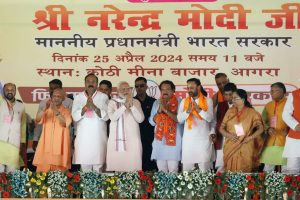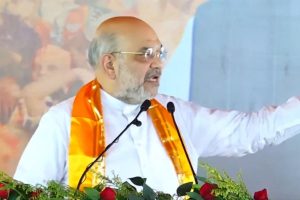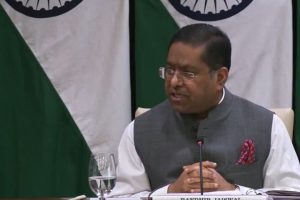Despite our Constitution being one of the lengthiest of such documents, in essence it retains its organic nature and flexibility, as evinced by over one hundred amendments during the past seventy years. In this context, flexibility of the Constitution would only mean that it is possible for the People (Parliament) to amend, without changing its basic character. The judiciary at the apex level interprets the Constitution and lays down the guiding principles through its judgments which then become binding. There is, however, no flexibility available to other institutions in the interpretation of laws, on the basis of principles already laid down by the Supreme Court. Such a flexibility at the implementational levels would lead to administration by convenience, which in a democratic country with multiple agencies, can lead to serious situations and chaos as yardsticks and principles would change in decision- making from case to case.
In one such recent matter, the Election Commission of India, sitting on a Sunday (September 29, 2019), issued a historic order and appears to have succumbed. The ECI granted a waiver from disqualification to the current Sikkim Chief Minister just a day before the last day for filing of nominations to the by-elections notified for the Sikkim Assembly. He has since contested the elections and has won with a huge margin. Prem Singh Tamang, Chief Minister of Sikkim, had been convicted for misappropriating Rs. 9.5 lakh in 1996 during his tenure as the minister for Animal Husbandry, for which he was sentenced on 28 December, 2016 to undergo one year’s imprisonment under the Prevention of Corruption Act 1988. Both the High Court and the Supreme Court upheld the Session Courts order of his conviction on 28 June 2017 and 10 November , 2017 respectively.
Notably, this journey of appeals from the conviction in the Sessions Court to its final disposal in the Supreme Court took less than eleven months. The conviction of Tamang brought him under the purview of the Representation of People’s Act 1951, Section 8(1)(m), which disqualified him for six years from contesting the election. Accordingly, he could not contest the April 2019 elections to the Sikkim Assembly. Nevertheless, the Governor swore him in as the Chief Minister, even though at the time of swearing-in he had remained disqualified. After he was sworn in as the Chief Minister, he moved the ECI on 6 July for a waiver of his disqualification.
One of the factors taken into account by the ECI for giving relief to Prem Singh Tamang was that “his party under his leadership has been given the mandate of the people in the recently concluded General Elections to the Legislative Assembly of Sikkim, 2019.” More or less in the similar case of the late J. Jayalalitha, former Chief Minister of Tamil Nadu, the Supreme Court had decided: “If the majority political party elects a person as their leader, whom the Constitution and the laws of the country disqualifies for being chosen as a member of the legislative assembly, then such an action of the majority elected members would be a betrayal of the electorate and the Constitution to which they owe their existence. In such a case, the will of the people must be held to be unconstitutional and, as such, could not be and would not be tolerated upon.
The action of the majority of the elected members of a political party in choosing their leader to head the government, if found to be contrary to the Constitution and the laws, then the Constitution and the laws must prevail over such unconstitutional decision, and the argument that the will of the people would prevail must give way.” The only difference is that while Jayalalitha had filed her nominations which were rejected during scrutiny, Tamang had not even filed his nomination on account of continuing disqualification. The Supreme Court did not even spare the Governor, Justice (retd.) Fathima Beevi, for whom it was said “In the instant case where the disqualification was apparent, the Governor was acting beyond his jurisdiction and against the Constitutional norms in appointing such a disqualified person as the Chief Minister on the sole reasoning that the majority of the elected members to the legislative council have elected the person concerned to be their leader.
The people of India and so also the elected members to the legislative assembly are bound by constitutional provisions and it would be the solemn duty of the people’s representatives who have been elected to the legislative assembly to uphold the Constitution. Therefore, any act on their part, contrary to the Constitution, ought not to have weighed with the Governor in the matter of appointment of the Chief Minister to form the government.” Yet in this case , Tamang with all his possible negatives was sworn in as the Chief Minister by the state Governor. The ECI in its order has reduced his period of disqualification to 1 year and 1 month. It means that they have accepted the disqualification, to be valid. For had it not been so, they could have simply said that disqualification was not attracted in this case at all, which in fact was the plea of the petitioner as well.
The reference to omission of Section 13(1)(d) of the POC Act, 1988, by an amendment in 2018, as such, appears to be contradictory, for Tamang had committed the crime in 1996 and was convicted in 2016 when the relevant provision of law was very much valid. Since he had also undergone the full jail term as prescribed, the subsequent omission of law could not have been a ground for reduction or revocation of disqualification. So what could the rationale behind 1 year and 1 month be, except that to enable Tamang to contest the election and file his nomination on the next day (the last day of nominations) after the ECI waiver. Further, the ECI in its order has quoted two previous instances involving murder convicts where the waiver was granted.
There is, however, a significant difference in the instant case as the example quoted by ECI in its order does not appear to be relevant. The reason being that the other two cases are of murder convicts where the State government had granted remissions, while in the instant case there was no question of any remission as the petitioner (Tamang) had undergone his full sentence in a case of corruption, besides which the state had never recommended any remission. Tamang has stated that since he had been sworn in by the Governor as the CM, it implied a pardon to him. Pardon of a convict post completion of his jail term has no legal sanctity. Similarly, he has taken the plea that “there was a presumption of justice and lawfulness after he had been sworn in as the Chief Minister.”
In this particular case, instead of upholding the fundamental principles of public life of probity and integrity, besides the constitutional values, the petitioner being the Chief Minister of a State and wanting to contest the by-poll, before coming under the bar of six months [Article 164 (4)], appears to have weighed heavily on the Election Commission of India while adopting a flexible approach in deciding this matter.
(The writer is a former Governor of Uttarakhand)











